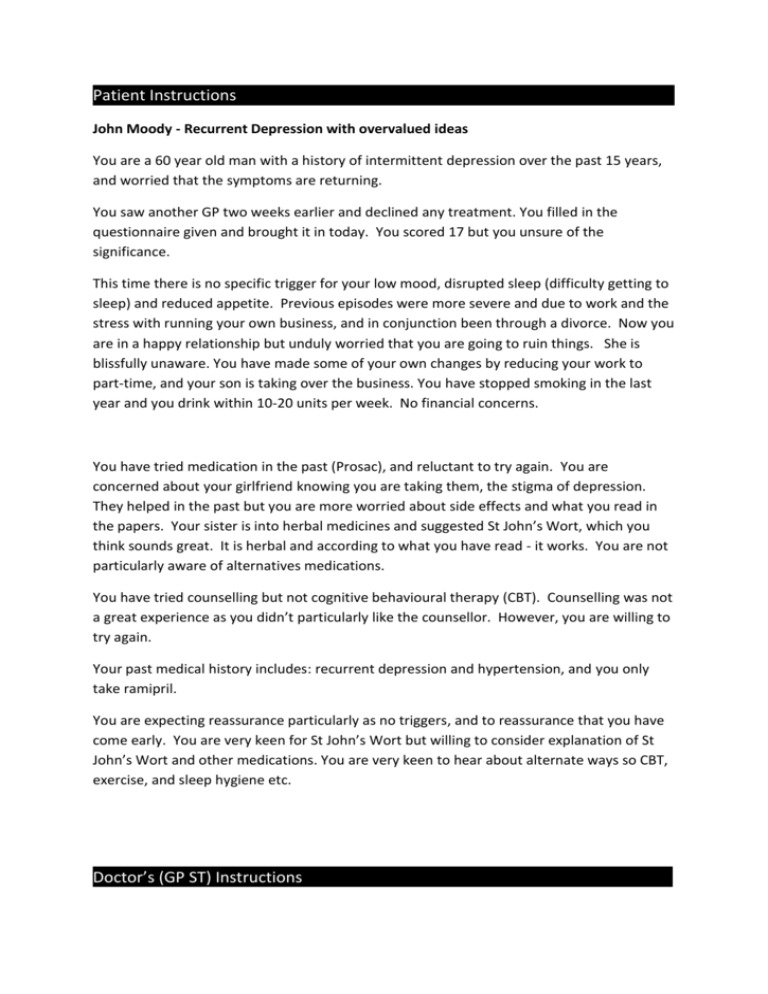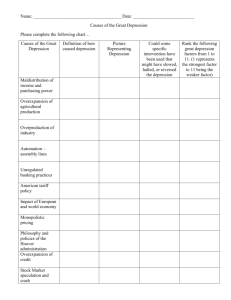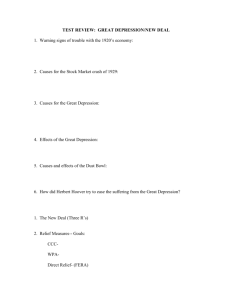depression - Pennine GP Training
advertisement

Patient Instructions o John Moody - Recurrent Depression with overvalued ideas You are a 60 year old man with a history of intermittent depression over the past 15 years, and worried that the symptoms are returning. You saw another GP two weeks earlier and declined any treatment. You filled in the questionnaire given and brought it in today. You scored 17 but you unsure of the significance. This time there is no specific trigger for your low mood, disrupted sleep (difficulty getting to sleep) and reduced appetite. Previous episodes were more severe and due to work and the stress with running your own business, and in conjunction been through a divorce. Now you are in a happy relationship but unduly worried that you are going to ruin things. She is blissfully unaware. You have made some of your own changes by reducing your work to part-time, and your son is taking over the business. You have stopped smoking in the last year and you drink within 10-20 units per week. No financial concerns. You have tried medication in the past (Prosac), and reluctant to try again. You are concerned about your girlfriend knowing you are taking them, the stigma of depression. They helped in the past but you are more worried about side effects and what you read in the papers. Your sister is into herbal medicines and suggested St John’s Wort, which you think sounds great. It is herbal and according to what you have read - it works. You are not particularly aware of alternatives medications. You have tried counselling but not cognitive behavioural therapy (CBT). Counselling was not a great experience as you didn’t particularly like the counsellor. However, you are willing to try again. Your past medical history includes: recurrent depression and hypertension, and you only take ramipril. You are expecting reassurance particularly as no triggers, and to reassurance that you have come early. You are very keen for St John’s Wort but willing to consider explanation of St John’s Wort and other medications. You are very keen to hear about alternate ways so CBT, exercise, and sleep hygiene etc. Doctor’s (GP ST) Instructions s John Moody A 60 year old gentleman Generally an infrequent attender. Attends for his annual check up for hypertension. Summary Card 1997 Depression 2003 Depression 2005 Hypertension Case Notes 2 weeks ago John saw a colleague for low mood and declined any treatment but was asked to complete a PHQ9 at home and to bring the questionnaire in a 2 week follow-up appointment PMH Hypertension Regular Prescriptions Ramipril FH Father had MI aged 59years CSA Examination Card Examination findings: John Moody Review completed PHQ-9: Result 17 Moderate Depression Mental State Examination - no concerns Recent bloods – satisfactory BP well controlled on medication o CSA Case Marking Sheet o Case Name: John Moody Centre: CRH Scheme name: Pennine GP ST Name: CSA Surgery Date: Case Title Recurrent Depression & overvalued ideas Context for case Recurrent diagnosis of depression Low mood, no triggers Overly concerned about ruining new relationship Extremely keen to try St John’s Wort Assessment Domain: 1. Data-gathering, technical and assessment skills Positive descriptors: Negative descriptors: Acknowledge and review PHQ9 Not taking an adequate social history Brief appropriate depression history Poor depression history what symptoms he is experiencing Not addressing his concerns and comparing to past episodes Does not acknowledge his ideas Acknowledges recurrent nature of regarding alternative therapies depression and address his concerns Does not address psychosocial/social Explores possible triggers for history depression and social history Does not address suicide risk Ask red flags - suicide risk Not taking a focused PMH, DH. Explores what he has tried in the past Forgetting about alcohol Identifies preference to alternative consumption/smoking therapies and reasoning Focused PMH, DH, inc alternative therapies and smoking & alcohol history Assessment Domain: 2. Clinical Management Skills Positive descriptors: Negative descriptors: Reassurance that he has come early No reassurance Reassurance that depression affects Not offering alternative treatments many and shouldn’t feel stigmatized, or explanations giving an explanation about No follow-up depression Not explaining risks-medications or Negotiate medication – a good not accepting help explanation of St John’s Wort and the Failure to safety net risks, and offering an explanation on Pressurising into treatments, not alternative SSRIs (advantages and offering choice side-effects). Reassure that a decision Inappropriate management of doesn’t have to be made depression immediately Offering follow-up Offering a referral for counselling/CBT Giving written info (PILs)-e.g. on SSRIs, depression and self help. Verbal self-help advice-exercise, reducing stress, sleep hygiene etc Assessment Domain: 3. Interpersonal skills Positive descriptors: Explores John’s agenda, health beliefs and preferences Responds to feelings and expectations Appears alert to verbal and nonverbal cues Elicits psychosocial and social information to put into context Works in partnership, common ground and develop a shared management plan Enhances autonomy Patient centred and shows empathy and interest Reassurance Global Comments Positive descriptors Click & enter Grading Clear pass Marginal pass Excellent Serious Concerns General Feedback Comments Negative descriptors: Does not enquire sufficiently into agenda, health beliefs and preferences Pays insufficient attention to verbal and non-verbal cues Fails to explore how it affecting his life Does not appreciate the impact of the patient’s psychosocial context Instructs patient rather than seeking common ground Used a rigid approach, doesn’t offer or respond to patient’s contributions Failure to empower Lacks warmth, empathy Little or no reassurance Negative descriptors Click & enter Marginal fail Clear fail






